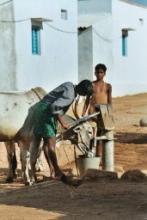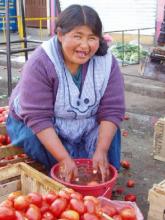Livelihoods
Joep Verhagen, A.J. James, Christine van Wijk, Reema Nanavatty, Mita Parikh, Mihir Bhatt (2004)
In general, women continue to have limited opportunities to influencing the design and operations of domestic water supply projects for their productive use of water and time. This report describes the findings of a pilot research project carried out in Gujarat, India. Together with the women and men of Gujarat, the relevance of women's productive use of water, the time gains for the family, the impact of such uses on gender relations, and the implications for policies, project design and operations management are among the issues that were examined.
The full report is available for download from the IRC website.
The study was carried out from June 1999 to April 2001 by the Foundation for Public Interest (FPI), the Self-Employed Women's Association (SEWA), and the IRC International Water and Sanitation Centre. The Swedish International Development Authority (Sida) financed the research.
Is something missing from your work in water supply? Do individuals and communities that you work with use their water supplies for multiple purposes? Are you challenged by how to help the poor gain access to water (beyond 'traditional' domestic or field-scale irrigation needs) for activities that generate food and income like fruit and vegetable production, keeping livestock, brick-making and building, and a wide range of informal micro-enterprises? Do you search for ways to improve cost-recovery?
Beyond domestic contains:
- evidence of how multi-purpose water supplies can help poor women and men to build sustainable livelihoods and fight poverty;
- analysis of the key issues relating to productive uses of water at the household level;
- details of practical experience on how to cater to the demand for productive water;
- links to further information and contacts.
The book will inspire and support professionals seeking to move beyond sectoral boundaries in domestic or irrigation water supply, and contains many suggestions for an agenda of policy change, implementation and further research.
Beyond domestic is jointly published by IRC International Water and Sanitation Centre, the Natural Resources Institute (NRI) and the International Water Management Institute (IWMI).
The full publication may be downloaded from the IRC website. A hard copy of the publication is also available. Please contact IRC at publications@irc.nl


